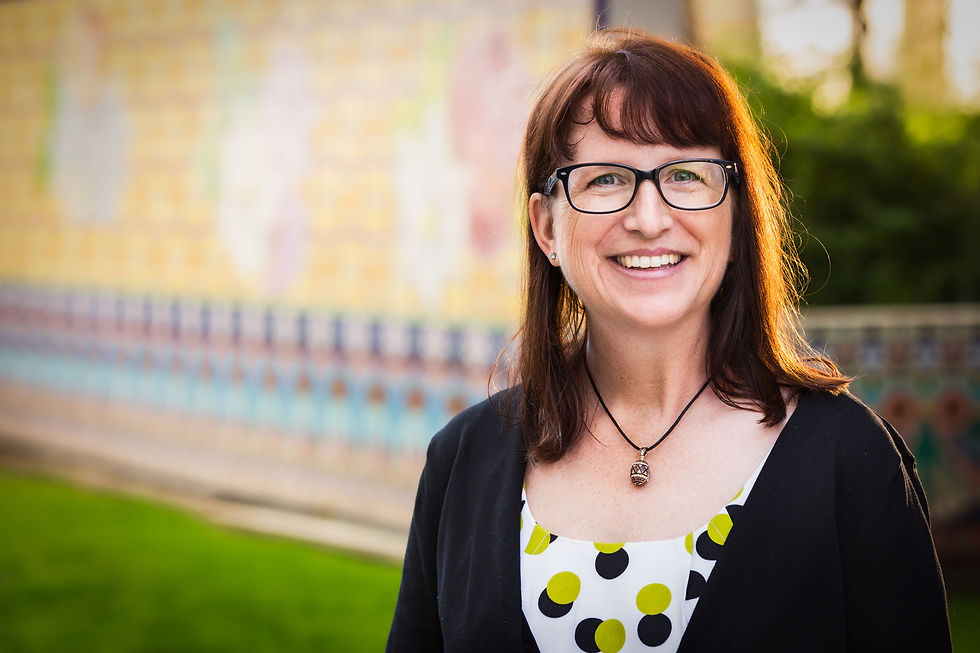Meet Amy Carlson
- Elizabeth Gracen

- Oct 9, 2018
- 4 min read
Updated: Sep 3, 2022
By Elizabeth Gracen:
I haven’t known Amy Carlson that long, but she has made a permanent impression on me. We are connected, both creatively and spiritually, to the Lineage Dance Company. Through Lineage, we met while I was filming a documentary called Dance for Joy, about the company’s Dancing Through Parkinson’s program.
We are new friends, but Amy is someone I feel I’ve known for a long time. Her creativity inspires me, and I truly believe she has insightful words of wisdom and practical advice for meeting each day with curiosity and hope.
Please meet Amy Carlson!

EG: Amy, could you share a little about your origins and early life? And I’m fascinated with the work you did with JPL.
AC: I grew up in the Midwest, in Greendale, WI, a small suburb of Milwaukee. I had two working parents, which wasn’t all that typical at the time. During my elementary school years my mom, an RN, taught nursing at Marquette University and my Dad was a database consultant back in the days of punchcards for Allis Chalmers. I was brought up in a no-nonsense house where pragmatism ruled the day. That was restrictive in some ways and freeing in others. Studying art meant piano lessons at the conservatory, not exactly a bastion of creativity. At the same time, there was nothing to stop me from participating in the Soap Box Derby race, building my own car with my Dad’s help and flying down a hill in said car, pigtails streaming, steering wildly, and ultimately crashing into a police car (no injuries reported)!
The stage was set for a career in engineering. Between the odd public school system I went to and my parents, no one ever told me that women were not engineers. Then I reached the University of Wisconsin at Madison where one of the professors kindly set me straight and asked me if I wouldn't rather major in something more feminine. I decided to leave Madison.
In a bizarre twist, my journey led me to Auburn University in Alabama, where I obtained a degree in Building Science. It was there in the south that I enjoyed the full support of some very dedicated professors who did believe that women belonged in the Sciences. My career took me to many places but the most exciting project was my last. The Giant Magellan Telescope is being designed by a team in Pasadena, California, and built in the mountains of Chile. This 22-story telescope will see back to the beginning of time when it is finished being constructed, and I am still honored to call that team my friends and colleagues.

EG: Please share your story—the beginning of your adventure that started in November of 2011.
I was sitting at my desk on a day in mid-November when I noticed a sort of thrumming in my left hand ring finger. No matter how I shook out my hand or stretched it, this feeling wouldn't leave. It felt like my finger was shaking. As time passed, the thrumming, shaking feeling extended into my hand, my arm, and my shoulder. By Christmas my hand would sometimes contract into odd contortions that were quite painful. Back massages, stretching, and pain relievers didn’t help. Eventually in February of 2012, about 5 months later, I was diagnosed with Parkinson's disease. I was 44 years old.
I work full time. I had three children and a husband: a really full life, and this was a complete shock to me, and I didn't know what it meant. I didn't know how Parkinson's would affect my life.
Years later, looking back, I can tell you that it affected my life unimaginably but that is not to say the change was horrible or devastating. I just couldn't have imagined how much my life would change because of Parkinson’s, and I definitely wouldn't have been able to tell you how much positive would come out of having this diagnosis.
EG: You’ve stated in your bio that Parkinson’s has saved your life. Could you elaborate on that?
AC: As much as I'm proud of my career, I spent most of my life on a treadmill thinking that happiness was just around the corner. I would be happy with the next promotion, the next larger, more exciting project. I always kept happiness and satisfaction in the future. I was always in a rush. I rarely took time to celebrate accomplishments or milestones in my life.
The diagnosis of Parkinson's disease in the beginning was like a nuisance fly buzzing around my head. I engaged in a healthy amount of denial and kept going on, ignoring that fly or occasionally swatting at it. The fact of the matter is that Parkinson's disease is a chronic, progressive disorder. It doesn’t get better, so it was not going to be denied for long. Eventually you have to face it.
When that moment came, I faced it and found strength and support from the people around me. I learned how to accept help for maybe the first time in my life. I slowed down and realized I had rushed through a lot of my life, not enjoying so much that is right in front of me because I was in too big of a hurry to get to that next place where the happiness was. What I learned is that there can be happiness right here.
Thank you, Amy. I’m very excited about you sharing your perspective on Flapper Press. You are a valuable, creative fire! I can’t wait to see what you write about.










Comments